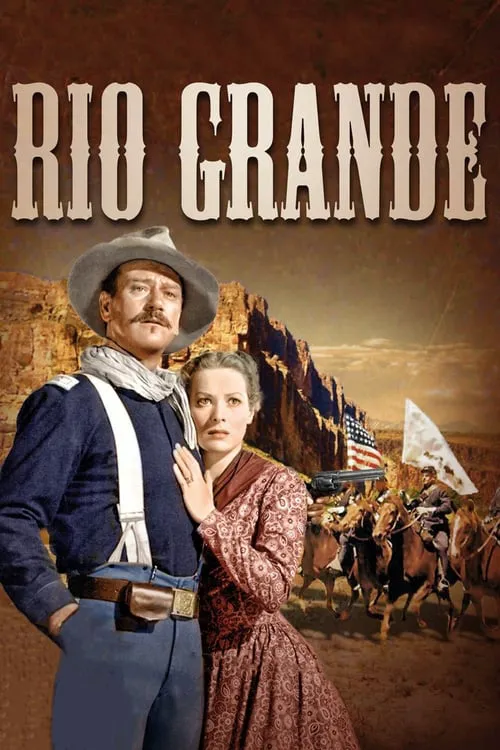Rio Grande

あらすじ
Rio Grande, directed by John Ford and released in 1950, is a Western film that revolves around the complexities of duty, family, and loyalty in the midst of a treacherous frontier. Lt. Col. Kirby Yorke, played by John Wayne, is a seasoned veteran of the U.S. Cavalry, posted on the Texas-Mexico border to protect settlers from the marauding Apaches. The year is 1879, and the region is characterized by lawlessness, violence, and isolation. As Yorke's 1st Cavalry Regiment faces a critical shortage of troops, he struggles to maintain order in the face of overwhelming odds. The scarcity of men is exacerbated by the constant skirmishes with the Apaches, who seem to be getting bolder by the day. Complicating Yorke's situation is his personal connection to one of the new recruits: his 15-year-old son, Jeff, played by Claude Jarman Jr. Jeff is a novice trooper, still grappling with his identity and his place in the military. As a father, Yorke is torn between his duty to the regiment and his paternal obligation to guide and protect his own flesh and blood. The relationship between Yorke and Jeff is a central theme of the movie. Their reunion after 15 years apart is marked by awkwardness and tension, reflecting the challenges of reconnecting with a child who has grown up without a father's influence. Throughout the film, John Wayne and Claude Jarman Jr. convey a nuanced portrayal of the complex bond between a father and son. Wayne, in particular, showcases his signature stoicism, but also occasionally cracks to reveal a deeper sense of vulnerability and paternal love. As the story unfolds, Yorke's regiment faces numerous challenges, including skirmishes with Apache warriors, rival Mexican bandits, and internal conflicts within the regiment. Yorke's leadership is continually tested, and his decisions often have far-reaching consequences. His men, including veteran troopers like Trampas and Cavendish, respect and admire Yorke's bravery and integrity. However, his son, Jeff, struggles to find his place within this tight-knit community and prove himself as a worthy soldier. The character of Sgt. Maj. Quincannon, played by Ben Johnson, adds a rich layer of complexity to the narrative. Quincannon is a grizzled veteran who has dedicated his life to the military, but he also has a deep affection for Yorke and his men. Johnson's portrayal is characterized by a dry wit and a no-nonsense attitude, which provides some much-needed comic relief amidst the film's somber and often violent tone. One of the standout aspects of Rio Grande is its thoughtful exploration of the U.S. Cavalry's treatment of Native Americans. The film raises questions about the morality of military campaigns against indigenous populations and the impact on both the troops and the Apaches. Yorke is depicted as a pragmatic commander who understands the necessity of maintaining order in a chaotic and unforgiving environment, but he also grapples with the ethical implications of his actions. The film's cinematography, shot by Arthur C. Miller, captures the vast and unforgiving expanse of the Texas-Mexico border. The landscape is both beautiful and treacherous, a fitting backdrop for a narrative that explores themes of duty, loyalty, and sacrifice. The camera work is often fluid and dynamic, using sweeping shots to convey the majesty and brutality of the natural world. Ultimately, Rio Grande is a thought-provoking Western that offers a nuanced exploration of the complexities of human relationships and the moral ambiguities of war. John Wayne delivers a compelling performance as the stoic and deeply human Lt. Col. Kirby Yorke, while the supporting cast brings depth and nuance to the narrative. As a father-son drama, a Western epic, and a cautionary tale about the costs of military conflict, Rio Grande remains a powerful and emotionally resonant film that continues to captivate audiences today.
レビュー
おすすめ




